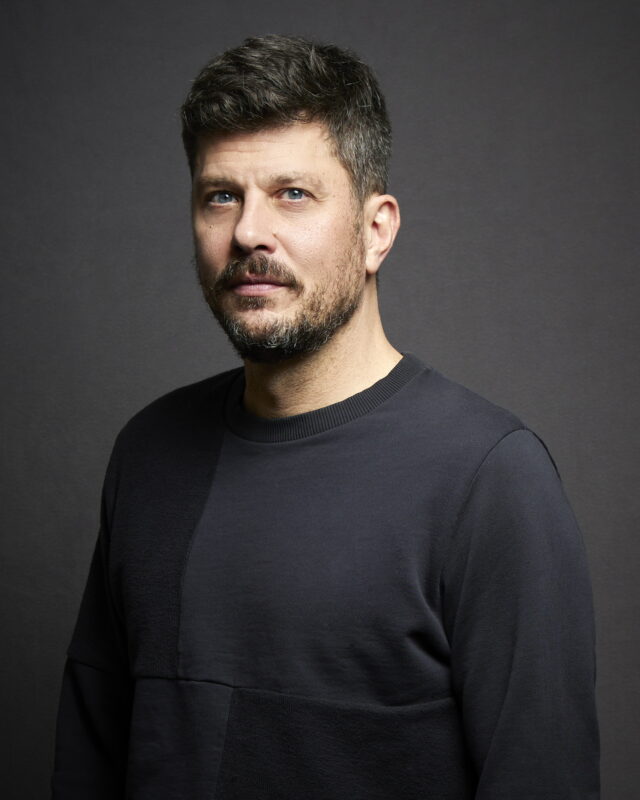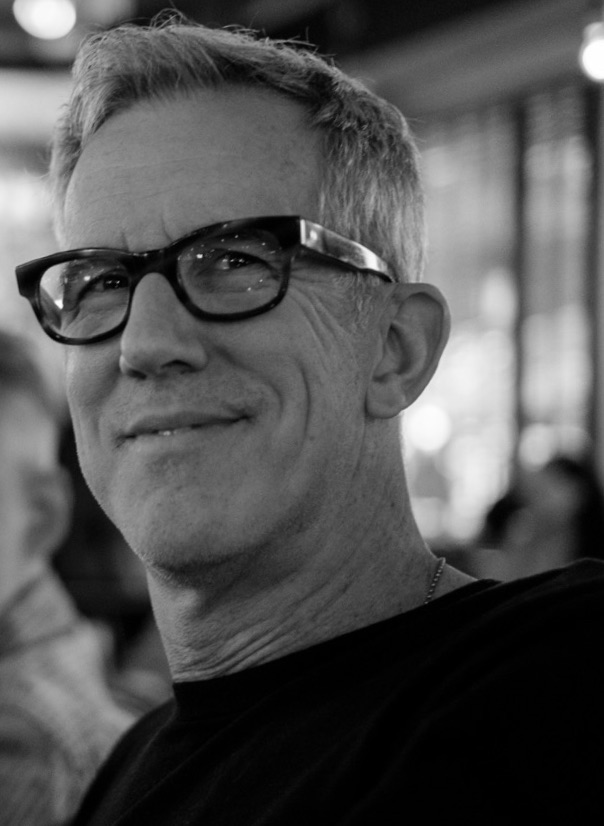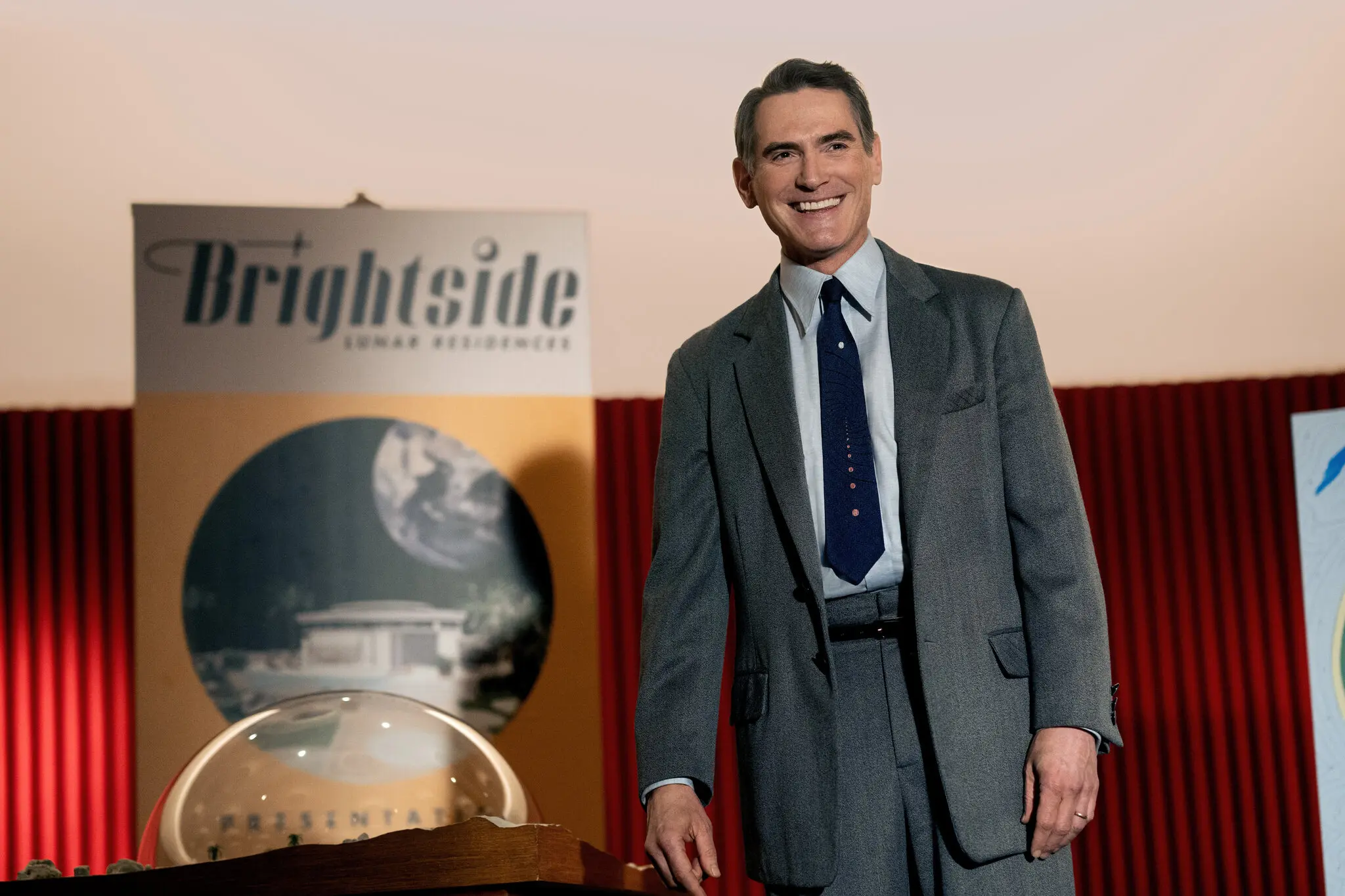By Rob Feld
“Hello Tomorrow!” tells the story of a group of traveling salesmen in a retro-future world, as they go town to town selling lunar timeshares. The show’s design and pacing would put one solidly in the 1950s if it weren’t for the quirky, floating robots and rockets to the moon. Created by Amit Bhalla and Lucas Jansen, the Apple TV+ series challenges editors Vanessa Procopio, Todd Downing, ACE, and Bill Henry, ACE, to define rules for a world we haven’t seen before.
In the series, Jack (Billy Crudup) is an ambitious salesman who was seemingly born to the profession. His infectious vision of a brighter tomorrow inspires his team of salespeople and gives hope to his desperate customers but conceals dark truths that threaten everything he touches. Unbeknownst to them, he brings his team to a town where the son he abandoned, Nick, now lives alone, his mother comatose in the hospital. Without revealing his identity, Jack takes Nick under his wing as a salesman, creating more secrets, changing the decisions he makes, and raising the level of the tightrope he walks.
CineMontage: Can you describe the workflow of this series? How do you guys collaborate with showrunners and how are episodes assigned?
Todd Downing: Well, we started during COVID so have been remote the whole time. It wasn’t until the wrap party that I met most people in person.

Todd Downing, picture editor. PHOTO: Courtesy Todd Downing.
Vanessa Procopio: We each had our own episodes and worked individually with directors and showrunners via Zoom, which wasn’t unusual. So, it didn’t feel that disconnected, except that we never got to know each other very well.
Bill Henry: I had the middle group of episodes—5, 6, and 7. Vanessa did 2, 3, and 4, then Todd came on board, reworked Episode 1 and then did the last three.
Procopio: That was a little unusual in that we weren’t checker-boarding the episodes, so we didn’t all stay until the end.We were trying to figure out how to build this world. It was such an unusual project—the time period was everything magical about the 1950s and everything you wished about space travel. So, we spent a lot of time trying to figure out what the sound of it would be, how things would work, how reliable the technology of the world would be.
CineMontage: It’s a unique world, aesthetically and conceptually. Can you talk about your discovery process, finding the rhythm of this weird time-place?
Downing: They did something really interesting, which I loved, in that a lot of the effects were hybrid. They would film real puppets then remove the puppeteer, ropes, and stuff afterwards. I think I had only one or two scenes where the actors were just acting against nothing on a sound stage. When the actors had the puppets in front of them, they had something to react to.
Henry: The assistants would go in and clean up as best they could while we were working on the episodes, to suspend our own disbelief while we’re working on it. I remember being stunned when I saw the first episodes with the cars floating freeform and the robots without the puppeteers. Throughout post it was a suspension of disbelief as to what was eventually going to be this magical, clunky, yet futuristic technology being presented.
CineMontage: What were you told about how to treat the world?
Procopio: From the beginning, the showrunners, Amit and Lucas, made clear that nothing was supposed to be perfect. The technology still didn’t work very well. Even though it could possibly be achievable, they hadn’t quite gotten it right yet. So, things would go off at the wrong time or the robots would repeat the same things without changing modulation. The technology wasn’t supposed to be smooth or reliable. It was fun to be part of the back and forth because it was a brand-new series and idea. Everyone was open to sharing ideas. We were kind of unleashed. I had this great assistant who took on the challenge of finding a variety of sounds we could play with, so by the time we presented it to the producers, we had come up with something they could react to.
Downing: The floating briefcase of this character, Costopoulos, was kind of his pet. When he gets mad at it and starts stomping on it, I used a dog whimpering sound that I modulated the hell out of. I turned this whimpering dog into a digital thing, which was in the spirit of the puppets, mixing the completely artificial with something a little real underneath. There was a real interest in keeping a tension between optimism and this aspirational, illusion of an American dream. We talked a lot about the Maysles’s documentary “Salesman.” The series is kind of poppy and fun but there is a very dark undercurrent to it, as well.
CineMontage: How are you choosing performance within that context?

Bill Henry, picture editor. PHOTO: Courtesy Bill Henry.
Henry: Billy Crudup is the central force the characters all revolve around. He has an extraordinary ability to present a sales pitch. So much is in his eyes and the way his face moves that recognizes the fact that he is not completely truthful—or at all truthful—about what it is that he’s pitching. Crudup’s ability to manage that with his face was extraordinary. The crux of it, as I worked through the sequences with Amit and Lucas, was making sure that we were able to track his emotional plotting while he’s conversing with the other characters in a way that was clear, because some of it is quite subtle and under-the-radar. You also want to believe while he is doing these horrible things—to his coworkers, to his family and son—that he was still a human being. We wanted to maintain a sense that he was conflicted about the lies he was spinning to everyone in his life.
Downing: Amit’s notes are the opposite of the common network note that you get to “take out the air.” He loves sitting on someone’s face. The actors we have are so talented and do these little things. It makes them feel real in such an unreal world. So, I appreciated that focus. It also fits for the time period; a more 1950s feeling that shouldn’t be like frenetic MTV. I really enjoy that type of emotional cutting.
Procopio: The interaction was delicate between Billy and his son, Nick. Nick didn’t know he was Billy’s son until late in the series. Billy wanted to teach him things while also holding things back. We did a lot of searching of Billy’s face and Nick’s face for that, to communicate that in those early episodes.
CineMontage: What kind of footage were you getting? Is it storyboarded or are you getting a lot of coverage to choose from?
Henry: It’s very different from director to director. I know when Vanessa had Jonathan Entwistle, it was all about single camera. Then when I got Ryan McFaul, who did all three of mine, he was running two cameras, which I found very helpful while I was putting it together. For example, there is a long dance sequence at the club. They had two moving cameras, following everybody and trying to make it a one-shot. That didn’t quite work so we wound up cutting into it with the B-camera. But it varied. Sometimes it was just slightly off axis. And then other times they would shoot each actor at the same time to get their coverage on the A and the B for expediency’s sake, and then go back and do the masters.
Procopio: I don’t think Jonathan shot any cross-coverage on two actors. Those instances would be a single-camera approach.
Downing: In some of the later episodes, like with the launch, Ryan used three cameras. That was some major coverage.
CineMontage: It does sound like everything was highly planned.
Downing: It wasn’t an off-the-cuff show. Hank Azaria threw away some one-liners, but for the most part it was pretty tight and scripted.
CineMontage: What would be the big narrative challenge for this show?
Henry: The duplicity of Billy’s character. Not just him—all the characters. Everybody is lying to everybody, so trying to manage that while keeping the audience from disliking them. You see the characters in these predicaments that force them into positions that cause them to lie. You’re following the idea that a little white lie is sometimes a better bet than telling the truth, to protect people’s feelings.
Procopio: It was important to follow what character knew what, when. As things were being slowly revealed, I remember thinking, does this character know that yet? Or, who told who, what? Does he understand and should the look in their faces reflect that they already know what someone is telling them? Those were big challenges.
“Hello Tomorrow!” is now streaming on Apple TV+.


